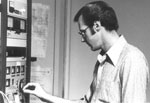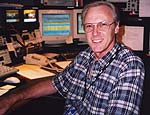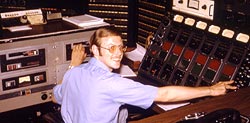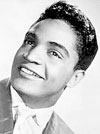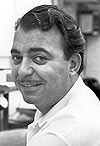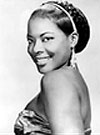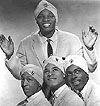The Don Kent Collection
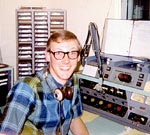
Don on Oldies-formatted KWIZ, 1967 
Don Kent on the board at KNX, 1972
|
Don Kent graduated high school in early 1964 and writes:"I had NO idea what career path to take. During my Senior Year I browsed through several college catalogs and came across "broadcasting" at Los Angeles City College. That sounded like fun. Besides, my dad had been in radio during WWII and it was sort of like following in his footsteps; well, kinda! I did pretty well at it, getting straight A's and a place on the Dean's List, so I figured that I'd found my "calling".
Back in those days I collected a bunch of aircheck tapes from my, then, favorite stations. I studied the techniques for school, but I just liked listening to them, too. Eventually, I connected with others who had done the same and we traded. While I was still in school I took a job doing the news part-time at KBLA in Burbank, CA. That was in 1965. It worked into a job offer from KWIZ AM/FM, Santa Ana, which, so far as I know, was the first all-oldie station anywhere. That ended in 1969 and I returned to the station in Burbank, which was now KBBQ (Country). I HATED the Country format, but by then I had a wife and son and I needed the job (didn't have to turn the monitor up, though!). The P.D. from KLAC, Los Angeles, heard me on the air and offered me a job at his station. Needless to say, I took it. After several months I switched over to the Engineering Department there. The station was co-housed with KMET-FM and I did Production-Engineering for both. In 1970 I moved over to KFWB, Los Angeles, as a Production Engineer. A couple of years later I briefly moved to KNX/CBS but didn't much care for it and returned to KFWB, where I stayed until 1979. That's when I moved over to television, where I did freelance audio work (common in that business) for a short time. That led to a staff offer from KTLA-TV in 1980. I started there doing "doofus work", but moved up the ladder to the position of Senior Engineer and later Crew Chief. Since moving to television my aircheck interests switched to restoration of early videotape recordings. I did all the restorations for the UCLA Film and Television Archive between about 1987 and 2002. In 1988 I won a Primetime Emmy for restoring the earliest television show recorded on color tape; "An Evening With Fred Astaire" (1958). Since then I have done several others, including The Nixon-Krushchev "Kitchen Debate" for the Library of Congress. I'm real proud of how those early shows turned out. Many years ago I collected rock 'n' roll records, but the "sound" changed from what I liked and I hung that up. I still have about three thousand records from back then though. In the intervening years since college, I just put those old aircheck tapes on a shelf in the garage. I haven't listened to them since the early 70's but they still sound pretty good, so enjoy! |
The Repository thanks Don Kent for sharing!
[Description by Uncle Ricky from notes by contributor Don Kent]
This is Hour 28 of the First and Original History Of Rock And Roll, as broadcast by KHJ/Los Angeles between 3PM and 4PM on Saturday, February 22, 1969. Our host is Robert W. Morgan.
This hour, focusing on 1958, features some extra goodies, including Steve Allen reading doo-wop lyrics, a doo-wop montage, and comments from Chuck Berry, The Everly Brothers, Conway Twitty and Dick Clark.
This was the first “Rockumentary”, produced by KHJ Program Director Ron Jacobs. Following the unprecedented success of this legendary broadcast, Jacobs left KHJ later that year. RKO made the show available to the other stations in their group, narrated by station-specific talent. When RKO was done with it, Drake-Chenault offered a re-recorded version in syndication three times between 1970 and 1982. An edited version (no jingle) of the last release, narrated by Bill Drake, was still in syndication as of 2006.

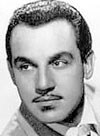
[Description by Uncle Ricky from notes by contributor Don Kent]
This is Hour 27 of the First and Original History Of Rock And Roll, as broadcast by KHJ/Los Angeles between 2PM and 3PM on Saturday, February 22, 1969. Our host is Robert W. Morgan. An additional highlight of this hour is a 20/20 newscast delivered by long-time KHJ newsman Marv Howard. Howard reports on the condition of Southern California’s first heart transplant patient, and the successful separation, by U.S. Army surgeons, of Siamese twins born in Vietnam.
This exhibit is a “reverse” restoration. Instead of restoring music, it utilizes Norm Garr’s contribution of the program, one generation from the original KHJ contest distribution, for the main program content. However, commercial sets and the newscast came from Don Kent’s original aircheck. This is the third hour of the “Rock” portion of The Original KHJ History of Rock & Roll, focusing on 1957, with the surprise inclusion of Screamin’ Jay Hawkins from 1954.
This was the first “Rockumentary”, produced by KHJ Program Director Ron Jacobs. Following the unprecedented success of this legendary broadcast, Jacobs left KHJ later that year. RKO made the show available to the other stations in their group, narrated by station-specific talent. When RKO was done with it, Drake-Chenault offered a re-recorded version in syndication three times between 1970 and 1982. An edited version (no jingle) of the last release, narrated by Bill Drake, was still in syndication as of 2006.
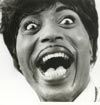

[Description by Uncle Ricky from notes by contributor Don Kent]
This is Hour 26 of the First and Original History Of Rock And Roll, as broadcast by KHJ between 1PM and 2PM on Saturday, February 22, 1969. Our host is Robert W. Morgan.
This, the second hour of the “Rock” portion of The Original KHJ History of Rock & Roll, focuses on 1956 and 1957, when rock & roll “became more than commercial rhythm and blues”. Still, R&B pioneers dominate the hour and there are comments from Art Laboe and Frank Zappa to support their importance to early Rock & Roll.
Thanks to Joel Whitburn we know that B.B. King started his remarkable career at WDIA in Memphis, and “B.B.” meant Blues Boy, and of course, he went on to influence thousands of talented performers, just like Fats Domino, who had hit records before anyone discovered “Rock & Roll”. And what about that James Brown? And remember, The Bobbettes shot Mr. Lee a couple years later, so I’m not so sure we want to remember the story at all…
This was the first “Rockumentary”, produced by KHJ Program Director Ron Jacobs. Following the unprecedented success of this legendary broadcast, Jacobs left KHJ later that year. RKO made the show available to the other stations in their group, narrated by station-specific talent. When RKO was done with it, Drake-Chenault offered a re-recorded version in syndication three times between 1970 and 1982. An edited version (no jingle) of the last release, narrated by Bill Drake, was still in syndication as of 2006.
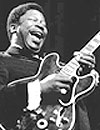

[Description by Uncle Ricky from notes by contributor Don Kent]
This is Hour 25 of the First and Original History Of Rock And Roll, as broadcast by KHJ between Noon and 1PM on Saturday, February 22, 1969. Our host is Robert W. Morgan.
Beginning before Billboard magazine’s Hot 100, the first hour of the “Rock” segment reaches back for classic R&B from 1952 into early 1955. Otherwise forgotten “radio archivist” Charles Hefty introduces Allan Freed. Also featured is the late Bert Convy, part of a group performing a song by legendary songwriting team Leiber & Stoller, and a montage presented as a tribute to the ubiquitous bass singers of the ’50’s.
This was the first “Rockumentary”, produced by KHJ Program Director Ron Jacobs. Following the unprecedented success of this legendary broadcast, Jacobs left KHJ later that year. RKO made the show available to the other stations in their group, narrated by station-specific talent. When RKO was done with it, Drake-Chenault offered a re-recorded version in syndication three times between 1970 and 1982. An edited version (no jingle) of the last release, narrated by Bill Drake, was still in syndication as of 2006.
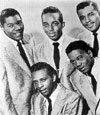
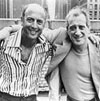
[Description by Uncle Ricky from notes by contributor Don Kent]
This is Hour 24 of the First and Original History Of Rock And Roll, as broadcast by KHJ between 11AM and 12 Noon on Saturday, February 22, 1969. Our host is Robert W. Morgan.
Focusing on selections from 1968, this hour is the last of the 12-hour “Pop Music” segment of the History. Included are comments from Dionne Warwick, Herb Alpert and Stevie Wonder. J. Paul Huddleston is featured with a 20/20 newscast, a portion of which suffers from a reception problem on the original recording. It goes away after a few minutes.
This was the first “Rockumentary”, produced by KHJ Program Director Ron Jacobs. Following the unprecedented success of this legendary broadcast, Jacobs left KHJ later that year. RKO made the show available to the other stations in their group, narrated by station-specific talent. When RKO was done with it, Drake-Chenault offered a re-recorded version in syndication three times between 1972 and 1982. An edited version (no jingle) of the last release, narrated by Bill Drake, was still in syndication as of 2006.


[Description by Uncle Ricky from notes by contributor Don Kent]
This is Hour 23 of the First and Original History Of Rock And Roll, as broadcast by KHJ between 10AM and 11AM on Saturday, February 22, 1969. Our host is Robert W. Morgan.
Focusing on selections from 1967, this hour continues the “Pop Music” segment of the History. Included are comments from Johnny Rivers, Bob Crewe and Jim Webb.
This was the first “Rockumentary”, produced by KHJ Program Director Ron Jacobs. Following the unprecedented success of this legendary broadcast, Jacobs left KHJ later that year. RKO made the show available to the other stations in their group, narrated by station-specific talent. When RKO was done with it, Drake-Chenault offered a re-recorded version in syndication three times between 1972 and 1982. An edited version (no jingle) of the last release, narrated by Bill Drake, was still in syndication as of 2006.


This is Hour 22 of the First and Original History Of Rock And Roll, as broadcast by KHJ between 9AM and 10AM on Saturday, February 22, 1969. Our host is Robert W. Morgan.
Focusing on selections from 1966, this hour continues the “Pop Music” segment of the History. Included are comments from Martha Reeves, Bobby Darin, Lee Hazlewood, Jim Webb, Brian Wilson and Mama Cass Elliot.
This was the first “Rockumentary”, produced by KHJ Program Director Ron Jacobs. Following the unprecedented success of this legendary broadcast, Jacobs left KHJ later that year. RKO made the show available to the other stations in their group, narrated by station-specific talent. When RKO was done with it, Drake-Chenault offered a re-recorded version in syndication three times between 1972 and 1982. An edited version (no jingle) of the last release, narrated by Bill Drake, was still in syndication as of 2006.
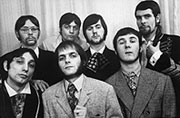
[Description by Uncle Ricky from notes by contributor Don Kent]
This is Hour 21 of the First and Original History Of Rock And Roll, as broadcast by KHJ between 8AM and 9AM on Saturday, February 22, 1969. Our host is Robert W. Morgan.
Featuring selections from 1964 and 1965, this hour continues the “Pop Music” segment of the History.
This hour also includes a ten-minute KHJ newscast with J. Paul Huddleston and sports with Danny Baxter.
This was the first “Rockumentary”, produced by KHJ Program Director Ron Jacobs. Following the unprecedented success of this legendary broadcast, Jacobs left KHJ later that year. RKO made the show available to the other stations in their group, narrated by station-specific talent. When RKO was done with it, Drake-Chenault offered a re-recorded version in syndication three times between 1972 and 1982. An edited version (no jingle) of the last release, narrated by Bill Drake, was still in syndication as of 2006.

This is Hour Fourteen of the First and Original History Of Rock And Roll, as broadcast by KHJ between 1AM and 2AM on February 22, 1969. Our host is Robert W. Morgan.
This hour continues the “Pop Music” segment of the History, featuring artists that were played on radio along with the new “rock and roll” performers, some of them performing “cover” versions of what many considered to be “race” music.
This hour also includes a ten-minute KHJ newscast with Lyle Kilgore (at 1:40 AM!) The Sirhan Sirhan trial is underway in Los Angeles, and the Clay Shaw trial, dramatized in Oliver Stone’s film JFK, was underway in New Orleans. And, this KHJ hour varies most significantly from the syndicated script used later, with the station’s legal ID embedded in Robert W.’s copy. Also included: the lawsuit-encouraging first-time hit song parody by Buchanan & Goodman.
This was the first “Rockumentary”, produced by KHJ Program Director Ron Jacobs. Following the unprecedented success of this legendary broadcast, Jacobs left KHJ later that year. RKO made the show available to the other stations in their group, narrated by station-specific talent. When RKO was done with it, Drake-Chenault offered a re-recorded version in syndication three times between 1972 and 1982. An edited version (no jingle) of the last release, narrated by Bill Drake, was still in syndication as of 2006.

[Description by Uncle Ricky from notes by contributor Don Kent]
This is Hour Thirteen of the First and Original History Of Rock And Roll, as broadcast by KHJ between Midnight and 1AM on February 22, 1969. Our host is Robert W. Morgan.
This hour begins the “Popular Music” segment of the History, digging way back before the phonograph. Then, before rock ‘n’ roll took over the charts in 1955, you’ll hear some wonderful (in Phonograph-Era Terms) “Pop Standards”. How many of these do you remember? Just a year or two before Elvis, note how many popular songs originated on Broadway or in movies of the era.
This was the first “Rockumentary”, produced by KHJ Program Director Ron Jacobs. Following the unprecedented success of this legendary broadcast, Jacobs left KHJ later that year. RKO made the show available to the other stations in their group, narrated by station-specific talent. When RKO was done with it, Drake-Chenault offered a re-recorded version in syndication three times between 1972 and 1982. An edited version (no jingle) of the last release, narrated by Bill Drake, was still in syndication as of 2006.
The morse code REELRADIO “copymark” included (thrice) in this exhibit is a reminder that duplication and distribution for trade or sale is illegal and inappropriate. Do not copy, do not trade, do not sell.


